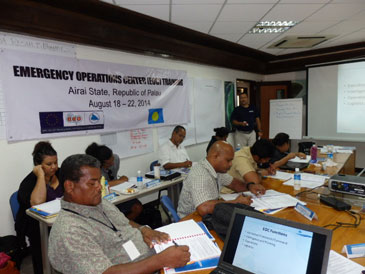
Participants from Palau Government departments, Palau Red Cross and the media attended training last week on establishing and managing Emergency Operations Centers.
In 2012, Typhoon Bopha impacted Palau and affected hundreds of people and destroyed 70 homes, displacing 131 people, while in 2013, Super Typhoon Haiyan devastated the whole northern-most state of Kayangel, destroying 39 homes and severely damaging dwellings from Babeldaob to Koror.
These two events highlighted a need for Palau to increase the number of personnel trained to manage the response to emergencies and to work in the National Emergency Operations Center. The Secretariat of the Pacific Community (SPC), through support from the European Union project, Building Safety and Resilience in the Pacific, is working with Palau to address this need by providing training in Emergency Operations Centers for 17 representatives of government, civil society and the media.
Ms Priscilla Subris, Coordinator of the National Emergency Management Office, opened the week-long training by stressing the importance of all agencies working together and thanking participants for taking the time ‘to learn how to be part of Palau’s response to future emergencies’.
On behalf of the Republic of Palau, Ms Subris also expressed appreciation to the European Union, the Secretariat of the African, Caribbean and Pacific Group of States and SPC for making the training possible.
The National Emergency Operations Centre, which was the venue for the training, was constructed with the support of the EU and under the supervision of the SPC through a multi-country project called: Disaster Risk Reduction in Eight Pacific ACP States. The centre was completed in May 2011.
During the training, participants studied the establishment and management of Emergency Operations Centers. They learnt about the facilities and equipment needed to ensure smooth running of a center, and staffing requirements and staff roles and responsibilities.
Information management – essential for effective decision making – was also covered in depth. The training ended with a five-hour table-top exercise in which participants put their new skills into practice in responding to a simulated emergency.
The training was supported by the European Union and implemented by SPC as part of the Building Safety and Resilience in the Pacific project. The purpose of the project is to strengthen the capacity of Pacific Island countries to address existing and emerging risks posed by natural hazards and related disasters, while maximising synergies between Disaster Risk Reduction (DRR) strategies and Climate Change Adaptation (CCA).
For further information please contact: Ms Priscilla Subris, Coordinator, National Emergency Management Office (
This e-mail address is being protected from spambots. You need JavaScript enabled to view it
);
or Noa Tokavou, Disaster Risk Management Officer (North Pacific), Secretariat of the Pacific Community (
This e-mail address is being protected from spambots. You need JavaScript enabled to view it
)





